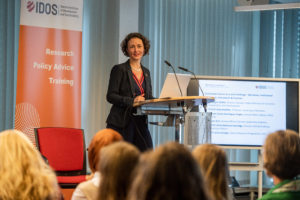December marks the end of an eventful calendar year for IDOS. While the Institute began the year as the Deutsches Institut für Entwicklungspolitk (DIE) / German Development Institute, it was renamed the German Institute of Development and Sustainability in June. Another important change besides the renaming was a personnel change in the directorate: in April, Dr Axel Berger succeeded Prof Dr Imme Scholz as deputy director of the Institute for two years. In addition, the appointment of Prof Dr Clara Brandi as Professor of International Economics / Development Economics at the University of Bonn as well as the appointment of the Institute’s International Academic Advisory Board were particular highlights of the institutional development of IDOS.
In terms of content, the year was strongly influenced by Germany’s G7 presidency and the Russian war of aggression in Ukraine. The importance of multilateral cooperation, especially against the backdrop of global crises, guided the research and advisory activities of IDOS.
Co-chair of the Think7 process
Together with the Global Solutions Initiative, IDOS was mandated by the Federal Chancellery to lead and shape the Think7 advisory process during the German G7 Presidency. IDOS supported and accompanied the organisation of events that brought together the G7 think tank communities with representatives from politics, business and civil society. The scientific expertise of IDOS also flowed into several policy briefs and the final Think7 communiqué, which Prof Dr Anna-Katharina Hornidge and Dr Axel Berger handed over to Chancellor Scholz during a Think7 discussion round. Against the backdrop of a partially blocked G20 in 2022, IDOS contributed to keeping transregional dialogue spaces open through policy dialogues and high-level roundtables, especially through a continuous exchange with the Think20 advisory processes under Indonesia’s G20 presidency.
Russian war of aggression against Ukraine
In addition to the G7 presidency, Russia’s war of aggression against Ukraine, which began in February 2022, was the main factor shaping the research and advisory activities of IDOS. The consequences of the war were not only felt in international cooperation itself, but also had an impact on domestic political discussions in the context of shaping the ‘Zeitenwende‘ (‘turning point’) declared by Chancellor Scholz and the National Security Strategy. Prof Dr Anna-Katharina Hornidge, Dr Jörn Grävingholt and Dr Julian Bergmann, among others, contributed to public and confidential opinion-forming processes through speeches and texts, advisory board activities and events.
COP27 in Sharm El-Sheikh
Research on structural challenges of multilateralism and on ‚Just Transition‘ were also continued and expanded in 2022. In particular, the research programme ‚Environmental Governance and Transformation towards Sustainability‘ contributed to the COP27 in Egypt through the participation of several research assistants and the organisation of various events. IDOS research and advisory activities reflect a strong focus on loss and damage and possible financing models.
Training and networks
However, the importance of multilateral cooperation is not only important for research and policy advice, but also a central component of IDOS‘ three postgraduate training programmes. We are pleased to have returned to physical teaching and interaction formats in 2022. The African-German Leadership Academy went through its first full year of training since its inception with great success and in close exchange with the African partner institutions. In addition, the Managing Global Governance Academy celebrated its fifteenth anniversary. The postgraduate programme said goodbye to its long-time director Dr Regine Mehl, who retired. Since September, Dr Simone Christ, who continues to reform the programme, has led the programme.

